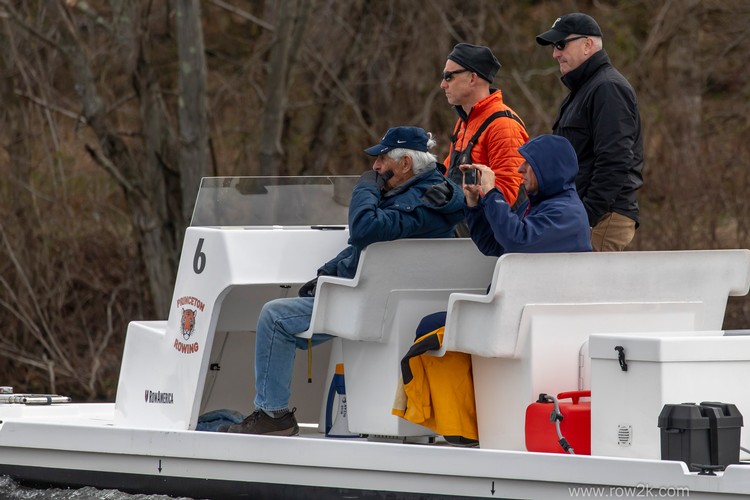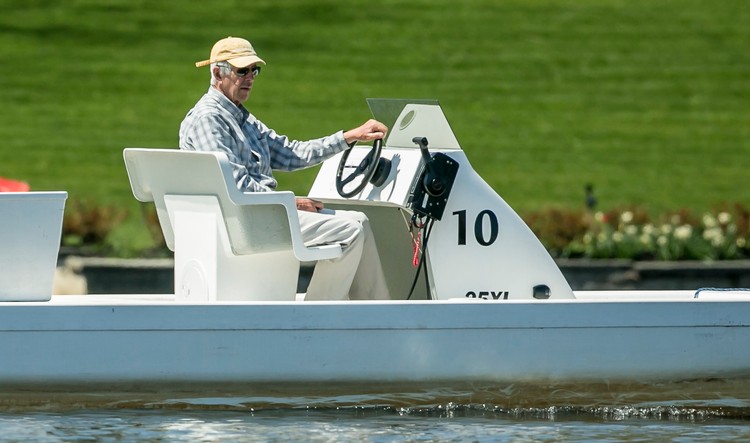Tony Johnson: A Spring Back in the Launch at 81 – Rowing Stories, Features & Interviews
Last spring, the Georgetown Heavyweight Men welcomed longtime coach Tony Johnson back to the starting lineup to guide them for the spring season. As mentioned in row2k’s IRA coverage, Johnson’s final campaign was successful as the Georgetown Heavy Four walked away with a medal. You can read the interview here.
In the weeks leading up to the IRA, row2k sat down with Coach to hear what it’s like to be behind the megaphone again.
Including this past spring, Johnson, now 81, has coached the Georgetown men’s heavyweight division for a total of 29 seasons (1967-69, 1989-2014, 2022) in addition to his 20 years at Yale, where he won the 1982 National Championship. Coach emeritus at Georgetown since 2014, he has also returned to the starting line to help the women’s team in 2018.
Johnson began rowing at Washington-Lee High School under Charley Butt, Sr., then rowed as a collegiate in Syracuse and competed twice in the men’s pairs Olympics, winning silver in his second games in 1968 with Larry Hough. He also served as the 1972 Olympic coach.
row2k: Can you tell us a bit about what it was like to be back at launch this spring?
Tony Johnson: My first realization of what I was getting into wasn’t actually in the barge, it was in the erg space, and at this point, you know, it’s only five days a week, so eight hours a week. So it was pretty easy, physically. [Once we were on the water] It was definitely a bit difficult for me to get used to the six days a week, early in the morning, and then come back for a few afternoon sessions [laughs].
But in the erg room I noticed that I felt energized. I felt like there was something of me there [coaching] Mindset: teach, learn names, learn people, learn who they were. It’s a really nice group of guys, a very willing group of guys. You listened. They tried. There was resistance to it, and old habits showed up, for her and for me. But the first thing I think of, and I remember it very clearly, is how energetic I felt. Some of that, I suppose, comes from a few years of the pandemic where I didn’t do very much, but it was also retired and not having regular contact with the crew. So it was a lot of fun. I enjoyed it. I enjoyed it at the very beginning. There’s a tiring side: you have to work, and it’s relentless [laughs]. You leave a morning practice and go home and there are all these damn phone calls and emails. But I still found it stimulating.
row2k: Over time, looking back at the scope of your career, has this stuff, this office work piece, changed outside of launch?
Tony Johnson: I don’t know how much has changed. I think the older I get the less tolerance I have for the rest of this stuff [laughs].
But there are new and different problems emerging now, problems the child could have of any kind – row-related and row-not-related, and there are many eyes on what the athletes are doing, and many of them then things work out again.
And there are more rules. I think of some of the issues that came up, and some of them were certainly understandable, especially in this day and age, and some of them were just a pain in the ass, but you have to deal with them and you can’t just count on thinking, ” Well, that’s how I used to do it.
The sport is the same, the rowing is the same. There are things I wanted to learn. I thought, “Well, I’m going to learn more about this new technology” – the boat speed GPS and all that, and some of it’s fun. Helpful for sure.
row2k: Do you find some of these new technologies confirming what you see with the eye? After all, you’ve been training on this river for a long time.

On Carnegie to the 1st race of the 2022 season, his 29th
Tony Johnson: It’s interesting that you ask that, because I still find my eye to be the most reliable tool I have. I have a feeling that maybe there are people who pay so much attention to the data that they forget you have to row well. Rowing well is work, it is pull, it is drive. Technically we’re looking for perfection and I guess without blowing my own horn I find that I rely on it: on what I see.
I’ve also found that I’m probably at my best the better I know the athletes and that means I have more time than I had with this group. If you start in September, you’ve spent a lot of time with the guys until January, until March. If you start in January, you tie an arm behind your back: It’s just a little bit more difficult… to choose a dash, to choose a tail section, I didn’t have that background. I would ask others about that. “Oh, you petted your first year?” Yes, maybe I should try that. I was at my best as a coach when I knew these people well and I understood that was an issue I had to deal with this spring.
row2k: Because you didn’t have enough knowledge or experience with these intangibles within the group?
Tony Johnson: Absolutely. There’s that value in keeping a log so you can look back and say, ‘Oh, we had a good four a few weeks ago: who was in that four? Maybe I should pay more attention to that line-up.” Absolutely. All of those things would help, but the importance of “knowing people well” is how I would put it.
row2k: Can you reflect a little on the amount of time you’ve spent coaching on the Potomac, or really on that river period? It goes all the way back to Washington-Lee High School under Charley Butt and then here in your pair with Larry Hough also practices for the ’68 Games, right?
Tony Johnson: Yes, there is a familiarity with the river, with the program, with Georgetown. And my style includes all the things that come to mind over time: good rows, mistakes, problems, how I’ve dealt with situations, and have done for many years.
row2k: Tied to the river, to this place?
Tony Johnson: Absolutely, to the Potomac. They are all precious memories.
row2k: What has been the best moment for you since you got back with the program this spring?
Tony Johnson: It’s hard to say: It’s a smaller squad – 20 rowers, three helmsmen, very young: many freshmen and sophomores. It was clear to me right from the start that there is almost no difference between first and second years in the Georgetown crew this year. The sophomores, almost to a man, weren’t on campus as freshmen. And so they were freshman year in college, freshman year in rowing, first year in everything, even though they were a hair older. That was half of our squad but some really good guys and good people too. They are grateful, which was nice and fun. The parents were grateful and supported me, that was good.
And that was fine. I wish we had gone faster. I felt for a long time that we were behind: when we were preparing for the first race, when we were out for two days, I’m doing things that we should have been doing six weeks later. There was a bit of catching up to do all along, and that was until the end of the year.
I thought the crew was a decent crew at the end of the year and yet we’re at the bottom of the field in the Eastern Sprint League and that’s uncomfortable and tough for the guys from a competitive perspective.
row2k: Looking back over the years of racing there, do you feel that the Eastern Sprints is a faster regatta than it used to be?
Tony Johnson: The level of competition is enormous. I think I knew a while back that second and third boats were so much faster than the old 2V and 3V and to see the 4V and 5V and what they do is wonderful. It’s competitive. A high standard.
When this year’s crew went out they rode hard and risked everything and you know we’ve accomplished at least that much and that was good. Both crews did that on The Sprints; They were back in the pack, but at least they saw that they really dug in.
So now I’m back to the fours for the IRA. It’s a decent four, but we still have some issues on how to do really well.
row2k: And that fours event can often be wide open.
Tony Johnson: Yes, well, let’s hope it is.

And it was…


Comments are closed.